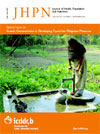
|
The Journal of Health, Population and Nutrition
icddr,b
ISSN: 1606-0997
EISSN: 1606-0997
Vol. 33, No. 1, 2015, pp. 68-75
|
 Bioline Code: hn15008
Bioline Code: hn15008
Full paper language: English
Document type: Research Article
Document available free of charge
|
|
|
The Journal of Health, Population and Nutrition, Vol. 33, No. 1, 2015, pp. 68-75
| en |
Predictors of Dietary Supplement Usage among Medical Interns of Tehran University of Medical Sciences
Sotoudeh, Gity; Kabiri, Sanaz; Yeganeh, Haleh Sadrzadeh; Koohdani, Fariba; Khajehnasiri, Farahnaz & Khosravi, Shahla
Abstract
This study aimed to determine the prevalence of dietary supplement-use and its relationship with demographics
and lifestyle of medical interns. The study sample comprised 356 interns aged 23 to 25 years.
Participants completed a questionnaire on dietary supplement-use during the month preceding the study,
information on demographic characteristics and lifestyle was also obtained. Univariable and multivariable
logistic regression were employed to assess the correlates of dietary supplement-use. The prevalence of dietary
supplement-use was about 33% (males 20.4% and females 43.2%, p<0.001). The most commonly-used
dietary supplement was multivitamin/multivitamin-mineral (90.6% in males and 52.3% in females). Approximately
30% of supplements were used regularly (≥5 days/week) by all subjects. The most-frequently
reported reasons for supplement-use in males were: enhancing daily energy/stamina (51.1%), poor food
intake (13.3%) and, in females, were: improving health and nutritional status (39.3%) and reducing hair
loss (23.4%). The decision to use dietary supplement was mostly driven by the interns themselves (56% in
males, 61% in females). In the univariable analysis, men who exercised once or twice a week were less likely
to use supplements compared to those who reported doing exercise more than twice weekly (OR=0.35,
95% CI 0.12-0.98). Females who reported their health status to be ‘excellent’ were more likely to use supplements
compared to those who described their health status as ‘moderate/poor/very poor’ (OR=2.53, 95%
CI 1.15-5.56) as were women who mentioned their breakfast consumption status as ‘always’ (OR=2.69,
95% CI 1.47-4.92). In the multivariable analysis, only breakfast consumption was significantly related with
dietary supplement-use in females (OR=2.20, 95% CI 1.11-4.38). In conclusion, dietary supplement-use
among medical interns, especially among females, was relatively very common. Dietary supplement-use
was related to a healthier lifestyle.
Keywords
Dietary supplement; Intern; Lifestyle; Tehran University of Medical Sciences; Iran
|
| |
© Copyright 2015 - The Journal of Health, Population and Nutrition
Alternative site location: http://www.jhpn.net
|
|
